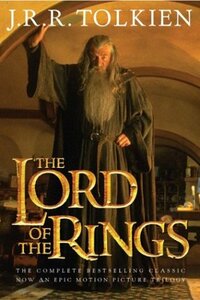Take a photo of a barcode or cover
adventurous
challenging
emotional
adventurous
challenging
emotional
slow-paced
adventurous
dark
emotional
funny
hopeful
reflective
medium-paced
Plot or Character Driven:
A mix
Strong character development:
Yes
Loveable characters:
Yes
Diverse cast of characters:
Complicated
Flaws of characters a main focus:
Yes
I took the whole series with me to the UK and read it all in my first week there. Awesome books.
I'd give ten stars if I could. This has been my favorite book since I first read it when I was twelve.
adventurous
emotional
hopeful
inspiring
slow-paced
Plot or Character Driven:
A mix
Strong character development:
Yes
Loveable characters:
Yes
Diverse cast of characters:
Yes
Flaws of characters a main focus:
No
adventurous
dark
emotional
funny
medium-paced
Plot or Character Driven:
A mix
Strong character development:
Yes
Loveable characters:
Yes
Diverse cast of characters:
Yes
I first fell in love with Middle Earth in second grade, when I saw Tolkien's world represented on film in Peter Jackson's "The Lord of the Rings" trilogy. As a young child, I was captivated by the magic of the world, the epic battle between good and evil, and the unreachable bonds of friendship formed between the characters. The source material builds upon these themes in every way.
To those who are interested in diving into the books, I would like to offer a brief word of caution: Don't rush it. I tried to read the books many times before I was able to finish "The Fellowship of the Ring," and when I completed my first full reading this past year, I only finished because I took three months to do so (and I enjoyed every second of it).
These books are dense and slow, but that is simply because they are so full of substance. Tolkien is truly a master of his craft. His language is incredibly precise, as one might expect from an Oxford English professor, and each word is deliberate. It is clear how much effort he poured into perfecting each line. Here is which I believe demonstrates this (spoiler free):
"Darkness lay there under the Sun. Fire glowed amid the smoke. Mount Doom was burning, and a great reek rising. Then at last his gaze was held: wall upon wall, battlement upon battlement, black, immeasurably strong, mountain of iron, gate of steel, tower of adamant, he saw it: Barad-dûr, Fortress of Sauron. All hope left him."
Tolkien also makes it incredibly easy to get lost in his world. There is simply so much substance to it. It does not feel manufactured to fit the plot, but like a real place. This is enforced by his fictional languages. For Elvish, Tolkien did not construct a small vocabulary for words that he wanted to use - he created an entirely functional language first, and the story only came after. Characters also frequently allude to unexplained stories and locations, which give the impression of depth. Again, this is not simply an illusion. The mythos which characters in the "The Lord of the Rings" refer to is elaborated upon in a number of supporting texts, such as "The Silmarillion," and the recently published "Beren and Luthien."
All together, I found reading "The Lord of the Rings" trilogy to be a unique experience, and one that I would recommend to fantasy fans, or anyone willing to grow enthralled with a world other than their own.
To those who are interested in diving into the books, I would like to offer a brief word of caution: Don't rush it. I tried to read the books many times before I was able to finish "The Fellowship of the Ring," and when I completed my first full reading this past year, I only finished because I took three months to do so (and I enjoyed every second of it).
These books are dense and slow, but that is simply because they are so full of substance. Tolkien is truly a master of his craft. His language is incredibly precise, as one might expect from an Oxford English professor, and each word is deliberate. It is clear how much effort he poured into perfecting each line. Here is which I believe demonstrates this (spoiler free):
"Darkness lay there under the Sun. Fire glowed amid the smoke. Mount Doom was burning, and a great reek rising. Then at last his gaze was held: wall upon wall, battlement upon battlement, black, immeasurably strong, mountain of iron, gate of steel, tower of adamant, he saw it: Barad-dûr, Fortress of Sauron. All hope left him."
Tolkien also makes it incredibly easy to get lost in his world. There is simply so much substance to it. It does not feel manufactured to fit the plot, but like a real place. This is enforced by his fictional languages. For Elvish, Tolkien did not construct a small vocabulary for words that he wanted to use - he created an entirely functional language first, and the story only came after. Characters also frequently allude to unexplained stories and locations, which give the impression of depth. Again, this is not simply an illusion. The mythos which characters in the "The Lord of the Rings" refer to is elaborated upon in a number of supporting texts, such as "The Silmarillion," and the recently published "Beren and Luthien."
All together, I found reading "The Lord of the Rings" trilogy to be a unique experience, and one that I would recommend to fantasy fans, or anyone willing to grow enthralled with a world other than their own.
Dit blijft voor altijd een meesterwerk. Heb nog geen enkel fantasieboek gelezen wat hier aan kan tippen.
Eine nichtendenwollende Folge von Landschaftsbeschreibungen umgeben von einer dünnen Story - ich schätze, ich war zu alt und fantasymäßig zu belesen um dem Charme des ersten seiner Art erliegen zu können. Sicher in vielerlei Hinsicht - auch linguistisch und historisch - höchst interessant; aber für mich keine lesenswerte Fantasy.







